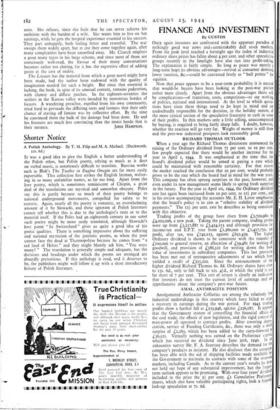FINANCE AND INVESTMENT
By CUSTOS
ONCE again investors are confronted with the apparent paradox of strikingly good war news and .unmistakably dull stock markets, From the peak level reached a fortnight ago the index of industrial ordinary share prices has fallen about 4 per cent, and other speculative groups recently in the limelight have also run into profit-taking. The explanation is fairly simple. So long as peace was merely a long-term hope its obvious advantages—revival of consumer demand, lower taxation, &c.—could be canvassed freely as "bull points" for equities.
Now that peace appears to be a near-term probability it is natural that would-be buyers have been looking at the -post-war picture rather more closely. Apart from the obvious advantages there will be complications—of transition, costs, competition—to say nothing of politics, national and international. At the level to which quota- tions have risen these things need to be kept in mind and arc undoubtedly responsible for the decision, in the holiday season, of the more cynical section of the speculative fraternity to cash in some of their profits. In thin markets only a little selling, unaccompanied by buying, is required to bring fairly sharp falls. I doubt, however, whether the reaction will go very far. Weight of money is still there and the post-war industrial prospects look reasonably good.
RICHARD THOMAS OUTLOOK
When a year ago the Richard Thomas directorate announced the raising of the Ordinary dividend from 7 per cent, to to per cent. few people expected that there would be another increase for the year to April 1, 1944. It was emphasised at the time that the board's dividend policy would be aimed- at paying a rate which could be maintained with reasonable certainty. For that reason the market reached the conclusion that to per cent, would probably prove to be the rate which the board had in mind for the war years. This company has often sprung surprises in the past, however, and even under its new management seems likely to spring fresh surprises
in the future. For the year to April 1st, 1944, the Ordinary dividend
rate has again been increased from to per, cent. to 121 per cent., and in his review accompanying the accounts Mr. E. H. Lever emphasises that the board's policy is to aim at "relative stability of dividend Is payments." The ni per cent, rate he describes as being consistent with this objective.
Trading profits of the group have risen from £3,720,980 to
L4,002,606, a new peak. Taking the parent company, trading- profits were up from £3,257,887 to £3,434,153 and although provision for income-tax and E.P.T. rose from £1,36o,000 to £1,457,750, net profit, after tax, was £740,123, against £632,439. The higher Ordinary dividend is shown to be consistent with the transfer of £roo,000 to general reserve, an allocation of £59,481 for writing off goodwill, and provision of £386,521 for writing down the book value of investments in subsidiary companies. This last provision has been met out of retrospective adjustments of tax which have yielded a credit of £325,2o0. Since the announcement of the higher dividend Richard Thomas 6s. 8d. Ordinary shares have risen to 13s. 6d., only to fall back to 12s. Lad., at which the yield is not far short of 7 per cent. This sort of return is clearly an indication that investors do not trust the current level of earnings and arc apprehensive about the company's post-war future.
AMAL. ANTHRACITE POSITION Amalgamated Anthracite Collieries are among the relatively fe/ industrial undertakings in this country which have failed to stag a recovery in earnings during the war period. For 1943 trading profits show a further fall at £205,946, against £226,187. It apPe311 that the Government system of controlling the financial affairs of the coal trade, the effects of new legislation, and the rigid control of man-power all operated to contract profits. After covering depre- ciation, service of Funding Certificates, &c., there was ,only a small surplus of £2,265, which has been added to the carry-forward g £36,521. Virtually nothing was earned on the Preference caPit31, which has received no dividend since June 30th, 1940. In au exhaustive survey Mr. F. A. Szarvasy describes the demand for the company's products as insistent. He also discloses that the company has been able with the aid of shipping facilities made available by the Government to maintain its contacts with some of the °verse.° markets, including Canada. As to the current year's results he clod not hold out hope of any substantial improvement, but the longa: term outlook appears to be promising. With over four years' dividen3 included in the price the 31- per cent. LI Cumulative Prefereoc; shares, which also have valuable participating rights, look a hopeful lock-up speculation at 7s. 641.


























 Previous page
Previous page